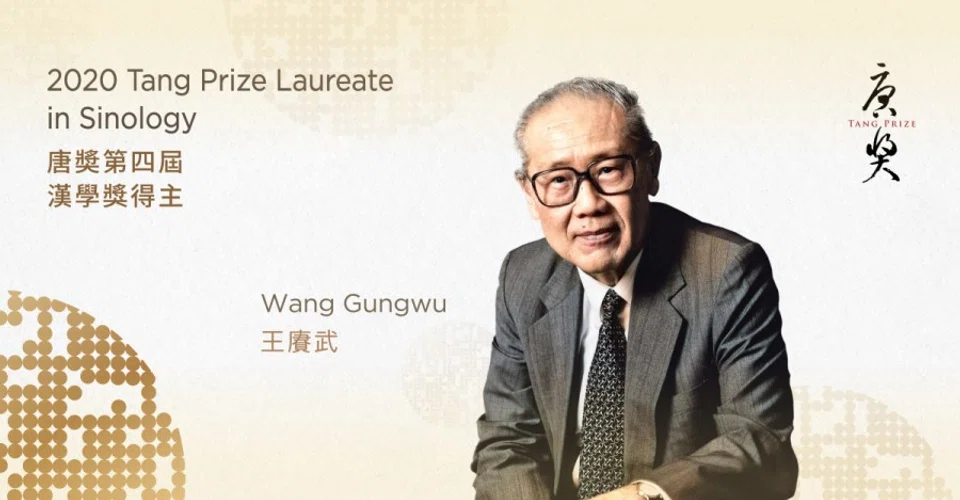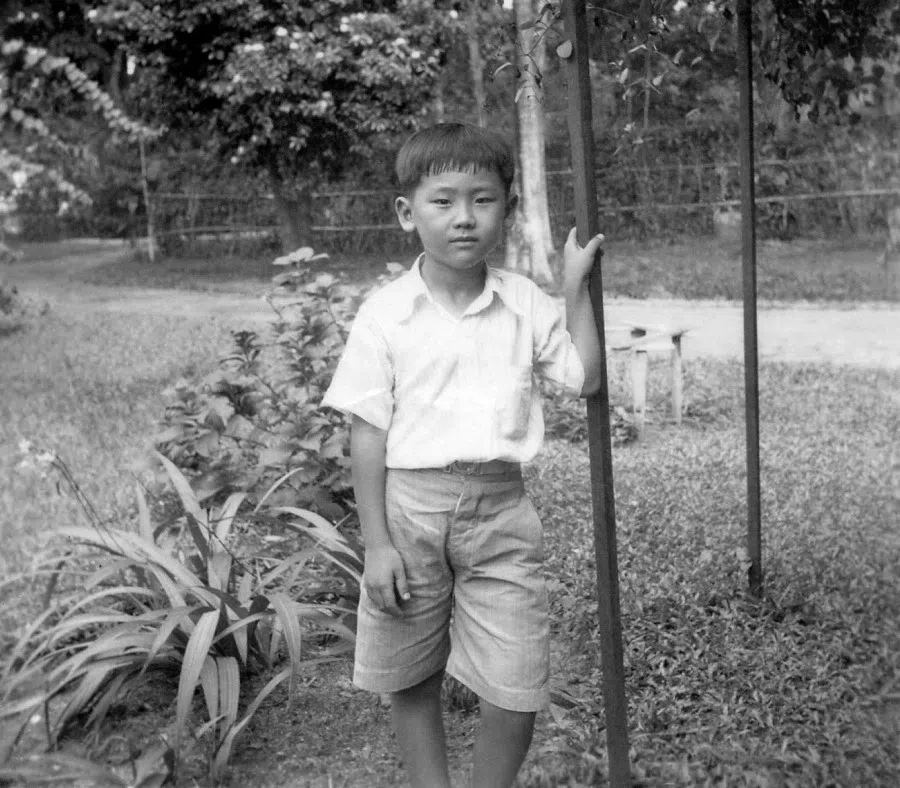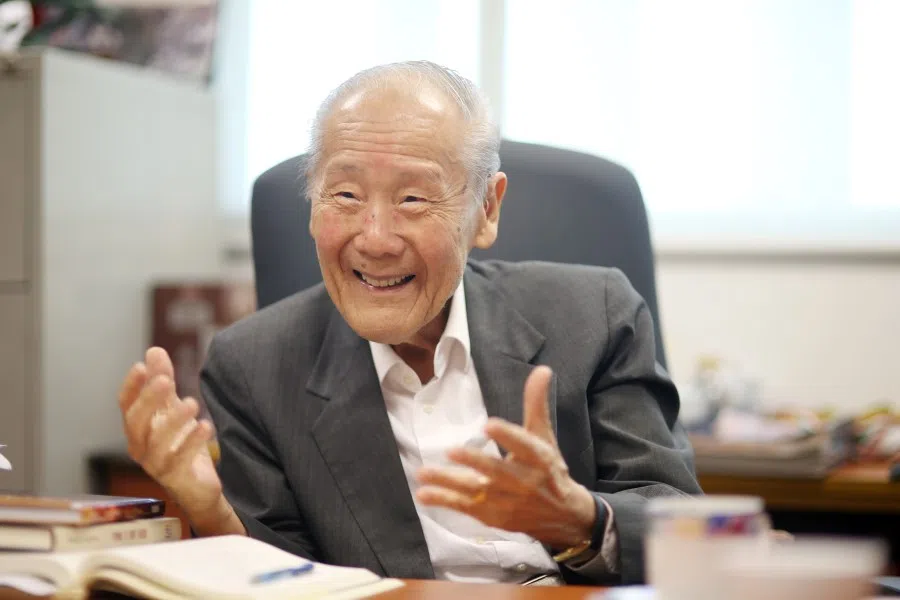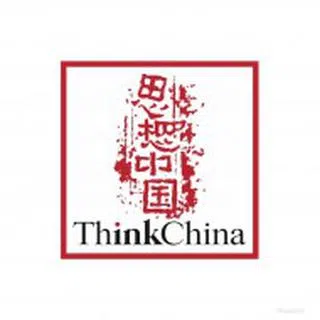Wang Gungwu: Sinology belongs to the world
On receiving the 2020 Tang Prize in Sinology, Professor Wang Gungwu said that while the foundation of sinology lies in China's long history and great tradition, many from around the world have contributed immensely to its study and advancement, and the research in sinology has been greatly enriched by Japanese, Koreans, as well as Western scholars. A broad concept of sinology will help modernise its studies, as well as improve its value and relevance to the interconnected world today.

Renowned historian Professor Wang Gungwu (University Professor of the Faculty of Arts and Social Sciences at the National University of Singapore) was announced as the recipient of the 2020 Tang Prize in Sinology today. The prize "recognises the study of sinology in the broadest sense", paying tribute to those who have advanced research on China and its related fields such as Chinese thought, history and literature. The selection committee praised Wang for his "trailblazing and dissecting insights on the history of the Chinese world order, Chinese overseas, and Chinese migratory experience".
It said that as the leading scholar on Sino-Southeast Asian relations, Wang "developed a unique approach to understanding China by scrutinising its long and complex relation with its southern neighbours. His erudition and critical discernment have significantly enriched the explanation of the Chinese people's changing place in the world, traditionally developed from an internalist perspective or in relation to the West."
In Tang Prize's short video capturing Wang's reactions to receiving the award, Wang discussed the realm of research in sinology both within and outside of China. He said sinology has been understood in different ways in the past, and if defined narrowly, he is not sure if he would be a suitable candidate. "But if you broaden the concept of sinology, which I consider to be a proper way today," he explained, "I am very pleased to be recognised as one."
Wang said given sinology's long history and great tradition within China, he had the chance to be brought up in a family that believed in guoxue (国学), while 19th-century Chinese official Zhang Zhidong's idea of zhongxue(中学为体, zhongxue weiti, Chinese knowledge as core) is what most people would understand as sinology today.
"In modern times, what is happening that is so impressive, is that outside of China, the European tradition of sinology, and the Japanese, Korean hanxue, have sort of come together..." - Wang Gungwu

However, he feels that it is important to recognise that there is also a long tradition of what might be called sinology outside of China. He said:
"The Japanese, the Korean scholars over the centuries, have been developing hanxue (汉学). Of course, in the West, with the coming of the Jesuits in the Ming-Qing transition period, they discovered China and they were utterly astonished at this great civilisation, and they began to study it very carefully, first along the lines of how the Chinese studied China, but they developed their own way of studying China, which was linked up with their own classical tradition. That I think became the basis of European sinology.
"In modern times, what is happening that is so impressive, is that outside of China, the European tradition of sinology, and the Japanese, Korean hanxue, have sort of come together, and the Chinese scholars who responded after the fall of the Qing dynasty in the guoxue tradition, have also slowly recognised that a lot of work done by the hanxuejia or sinologists are very useful and helpful, in fact, augments, supports and supplements the guoxue tradition. So I think the coming together of the guoxue and hanxue has been one of the wonderful achievements of the 20th century.
"Today, of course, modern sinology goes even further than that. Now the modern sinologists also take into account the new methodologies developed particularly in Western social sciences, some of those methods were never quite recognised before. That coming together I think has enriched the field again."
"Sinology is not just the study of the ancient past. It includes what has happened to China in the last couple of hundred years, and how China has reconnected with that past and also made advances, or made efforts to advance and progress..." - Wang Gungwu
He hopes that young scholars will take the broader view of sinology rather than the narrow view. He said while the narrow view is also important, the broader view recognises the knowledge of sinology that has been developed around the world, which might be helpful or relevant to enrich the field of sinology.
Sharing his own experience, Wang said although he was brought up in the tradition of guoxue, at the advice of his father, he decided to be more focused in his research. From literature, he turned to history, which became a subject he has honed his expertise in since then. "The focus is on the historical approach to the study of China, the thousands of years as well as modern history, this is part of sinology, this is important today. Sinology is not just the study of the ancient past. It includes what has happened to China in the last couple of hundred years, and how China has reconnected with that past and also made advances, or made efforts to advance and progress towards recognising all the other great things that are happening around the world."

He said in other words, this means that the world outside is now very important to China, and it is important that the study of China recognises that China's position in the world is a major part of modern sinology today.
Hence, he would encourage young academics interested in pursuing a career in the field to master the foundation of hanxue, to focus on a particular aspect (such as history), and to help enrich and broaden the field to make China studies a far more important field than it is recognised to be today. In the end, the study of China should also be of value to the world as a whole.
Wang said that he is very honoured to receive the Tang Prize in Sinology, and to join the group of distinguished scholars who make up the previous recipients of the Prize. Past awardees include Yü Ying-shih, William Theodore de Bary, Yoshinobu Shiba and Stephen Owen. The biennial Tang Prize was established by Taiwanese entrepreneur Dr Samuel Yin in the four categories of sinology, sustainable development, biopharmaceutical science and rule of law, to promote "interaction and cooperation between cultural and technological research so as to find a 21st-century path to the sustainable development of the world". NT$40 million (approx. US$1.33 million) in cash and a research grant of NT$10 million (approx. US$0.33 million) are awarded to each category. The award ceremony will be held in September this year.





